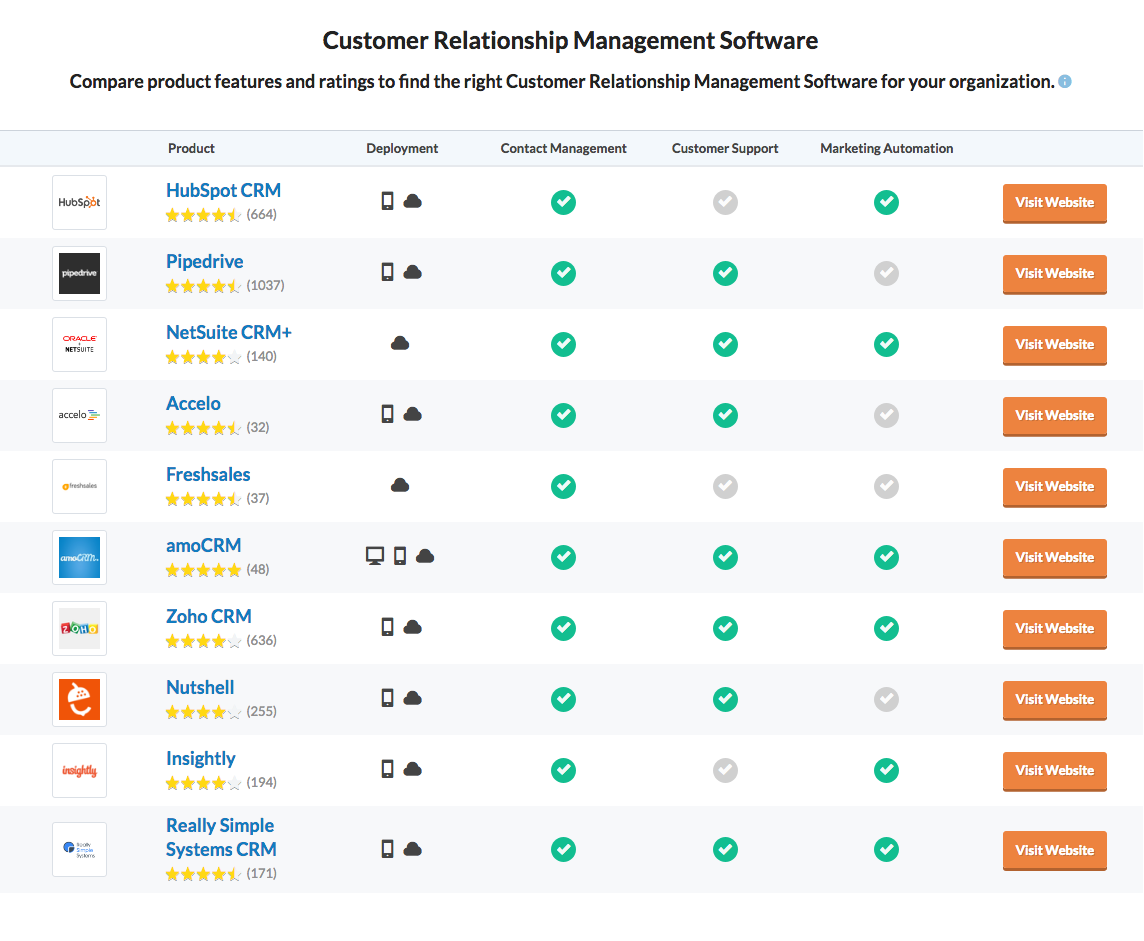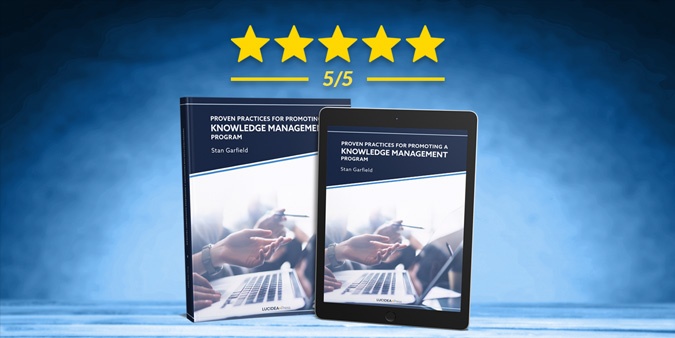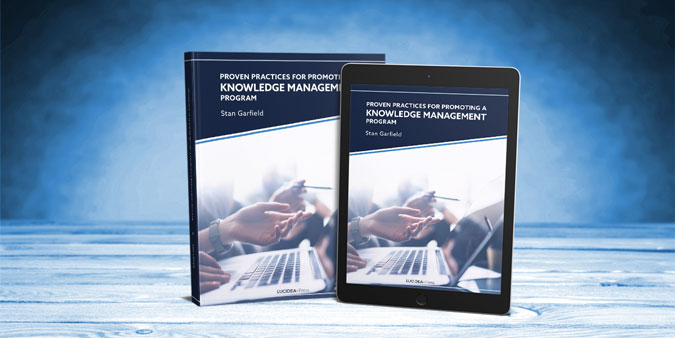Education is required when introducing a new KM initiative, during roll out across your organization, and as a key part of ongoing implementation. You must continue to offer training in a variety of ways; once is never sufficient. Please read on to learn the elements of a knowledge management training program, drawn from my new book, Proven Practices for Promoting a Knowledge Management Program.
We've Moved!
Think Clearly has a new home! Click here to see our latest posts.
*If there’s older content you’d like to catch up on, you can browse right where you are, until Friday, April 5th.
We know it takes a minute to get used to change!
Topics: Knowledge Management, Professional Development, Marketing, Training, KM, User Engagement
Part Four: Client Engagement in Special Libraries—Simple Tactics to Build On
Our first three posts defined customer engagement and focused on our clients/colleagues. We suggested a strategy for identifying and connecting with the colleagues we serve. We looked into gaining a better understanding of ourselves as people, and we reviewed the core skills for listening. In this post we design a roadmap for engaging colleagues in the various specialized settings of information professionals.
Topics: Library Management, Management, Special Libraries, User Engagement
How (and Why) My Favorite Brick and Mortar Bookstore Continues to Thrive
Frequent travelers through San Francisco’s airport who love to read have probably stopped in at Compass Books in Terminal 3. The quality and range of their selection always impresses me, as do the knowledgeable staff. Recently, when SFO underwent significant renovations, I feared the store had closed—another victim of the digital age.
Topics: Library Management, Information Management, Management, Marketing, User Engagement
Part Three: Client Engagement in Special Libraries—What are the skills and competencies for engagement?
In our first two posts in this series, we defined what customer engagement is in the special librarian’s context, and outlined an approach to building a special library focused customer relationship management system.
Now, let’s ask ourselves what are the major competencies required for success? What should we invest our personal development focus on?
Topics: Library Management, Management, Special Libraries, User Engagement
As mentioned in my first post on this topic, in order to sell knowledge management to your stakeholders, you first need to become a KM expert yourself. As an expert, you’ll develop a very clear understanding of KM’s benefits to your unique organization. I included seven of the major benefits of having a successful knowledge management program in Part One of this post; here are another eight—drawn from my new book, Proven Practices for Promoting Knowledge Management.
Topics: Knowledge Management, Knowledge Management Systems, Proven Practices
Part Two: Client Engagement in Special Libraries—Tracking and engaging your clients
My last post defined terms related to customer engagement and focused on the personal relationship-building component of our mandate with our target colleagues.
A major element of building relationships is knowing your colleagues well. No one’s memory is perfect. You can’t remember everything, and you may be working in teams (although this is useful for solos too). For sustainability and teamwork, you need to build a database that pulls together your knowledge of your clients and colleagues.
Topics: Library Management, Solo Librarianship, Management, Special Libraries, User Engagement
To sell knowledge management to your stakeholders, you first need to become a KM expert yourself. This involves developing a very clear understanding of KM’s benefits to your unique organization. Please read on for seven of the major benefits of having a successful knowledge management program, drawn from my new book, Proven Practices for Promoting Knowledge Management Program
Topics: Knowledge Management, Knowledge Management Systems, Proven Practices
This series of blog posts on client engagement is inspired by a reader comment. Thanks!
“I appreciate Stephen Abram's tips. Could you talk more of 'engagement'? How can special librarians 'engage' employees? THANK YOU!”
This reader comment has inspired me to think more deeply about how special librarians and information professionals need to behave differently on the customer engagement front. Yes, special librarians are different!
Topics: Library Management, Solo Librarianship, Management, Integrated Library Systems, Special Libraries, User Engagement
There will, no doubt, be certain jobs and industries that will be dramatically impacted by artificial intelligence (AI). However, that can be said about virtually any technological innovation introduced in the past 30 years. A more interesting question might be, “How does the hype surrounding AI affect my career today?”
Topics: Library Management, Knowledge Management, Knowledge Management Systems, Integrated Library Systems, Museum Collections Management Software, Artificial Intelligence, Archives
Why Won’t People Share Knowledge, and What Can You do About It?
To change a culture from one of knowledge hoarding to one of knowledge sharing, we must first understand why people may not be sharing their knowledge with one another. Below are some of the main reasons—along with recommended solutions—drawn from my new book, Proven Practices for Promoting Knowledge Management.
Topics: Knowledge Management, Proven Practices
How to Break the Gravitational Pull of Legacy Software Applications
We have all been there, and I’ve been there a lot. In the not too distant past, I was required to use an IBM mainframe to do my “word processing” when PC based solutions had far better functionality. Later, I was required to use email software that wasn’t compatible with the internet. The list goes on, and the problem still exists. There is hope: please read on for some ideas on how to break away from legacy software.
Topics: Library Management, Knowledge Management, Knowledge Management Systems, Integrated Library Systems
5 out of 5 Stars for a “rich and practical source of proven KM programs and practices”
Jean-Claude Monney, Chief Knowledge Officer, Microsoft Enterprise Services, recently awarded five stars to Stan Garfield’s new book titled Proven Practices for Promoting a Knowledge Management Program. This comprehensive text, published by Lucidea Press, is an actionable guide to promoting knowledge management practices within your organization. If you want your KM program to achieve maximum success, you simply must read this book.
Topics: Knowledge Management, Proven Practices
In a recent post, The CKO of Microsoft Services Has a Surprising Perspective on Knowledge Management, KM blogger Nancy Dixon summarizes a conversation about people, process and technology with Jean Claude Monney, CKO of Microsoft Services. Mr. Monney touches on “no collar” workers, who should be added to “white collar” and “blue collar” when we talk about the people side of knowledge exchange.
Topics: Library Management, Knowledge Management, Management
In his “Knoco Story,” Dealing with the Important Urgent Knowledge First, KM expert Nick Milton discusses the difference between important and urgent information and knowledge. Understanding this difference is key for special librarians and other knowledge professionals as they manage workflow and resources to best support their end users and deliver the most impact.
Topics: Library Management, Solo Librarianship, Management
In their recent Harvard Business Review article, Help Employees Create Knowledge—Not Just Share It, John Hagel III and John Seely Brown argue “the most valuable form of learning today is actually creating new knowledge.” Traditional KM systems represented a huge leap forward in terms of making explicit knowledge accessible and structured, but what knowledge management strategies and applications do we need in today’s business environment in order to maximize the intersection of knowledge and learning?
Topics: Knowledge Management, Knowledge Management Systems, Strategy
The single most important “KM sale” you can make is to your senior leaders. In my first two posts on this topic, I asserted that in my experience, if you get them on board, everything else will be much easier. If you can’t: try, try, and try again. Valuable tools for getting leaders' sponsorship and support include telling stories, making the business case, and selling the benefits. Please read on to learn about selling the benefits, drawn from my new book Proven Practices for Promoting a Knowledge Management Program.
Topics: Knowledge Management, Knowledge Management Systems, Proven Practices
As information professionals we are often asked to give our advice and our professional opinion on a number of issues and projects. Sometimes it is difficult to offer guidance confidently, yet it is our obligation to do so. In this post I’ll offer my thoughts on why and how to begin.
Topics: Library Management, Solo Librarianship, Management, Integrated Library Systems
Ready to Read: Proven Practices for Promoting a Knowledge Management Program
I’m pleased to announce that my new book, Proven Practices for Promoting a Knowledge Management Program, is now available. Published by Lucidea Press, it will show you how to build a successful knowledge management program that gets ongoing leadership commitment and creates a knowledge-sharing culture. Please read on for more detail, and a special offer from Lucidea.
Topics: Knowledge Management, Proven Practices
















